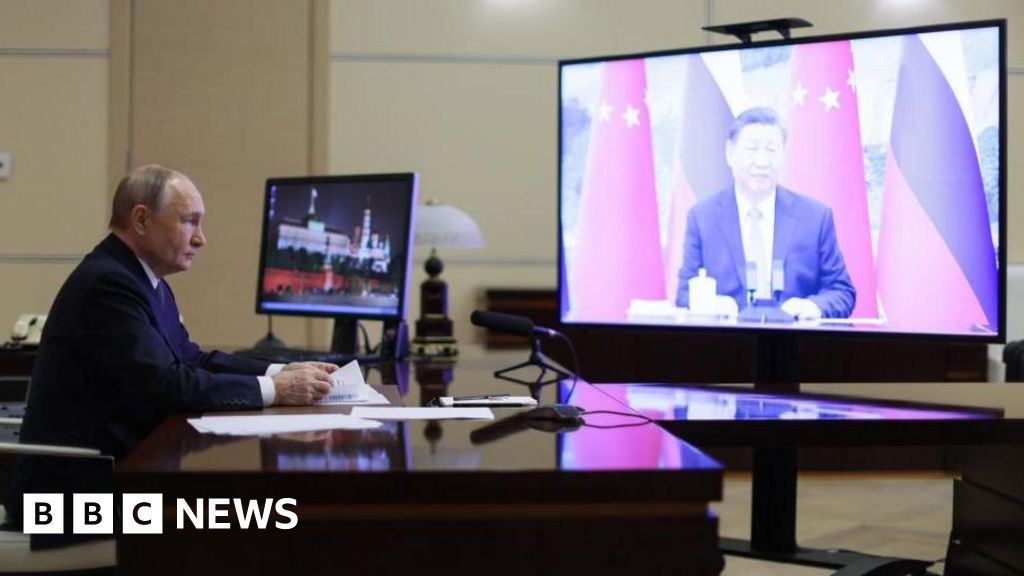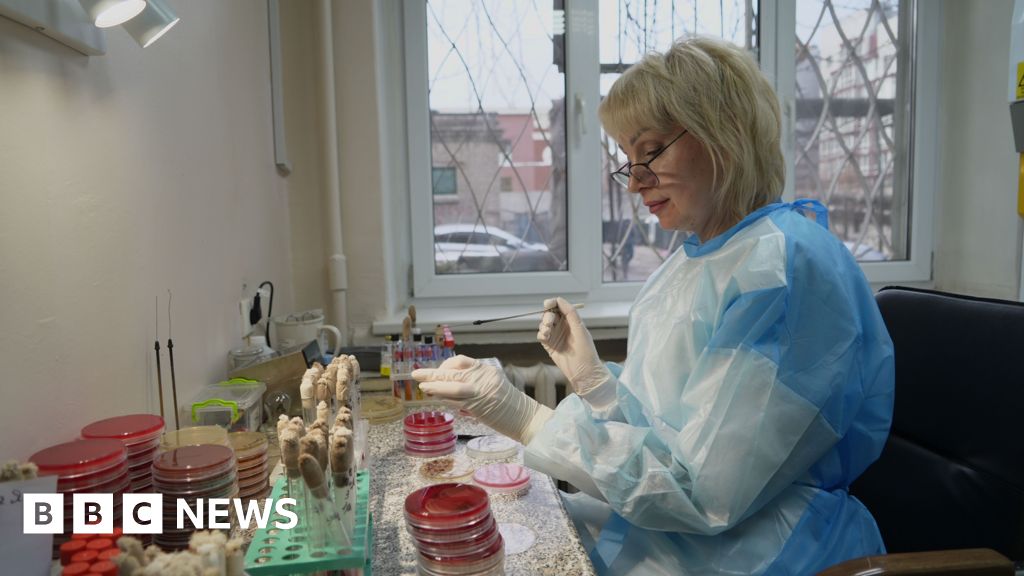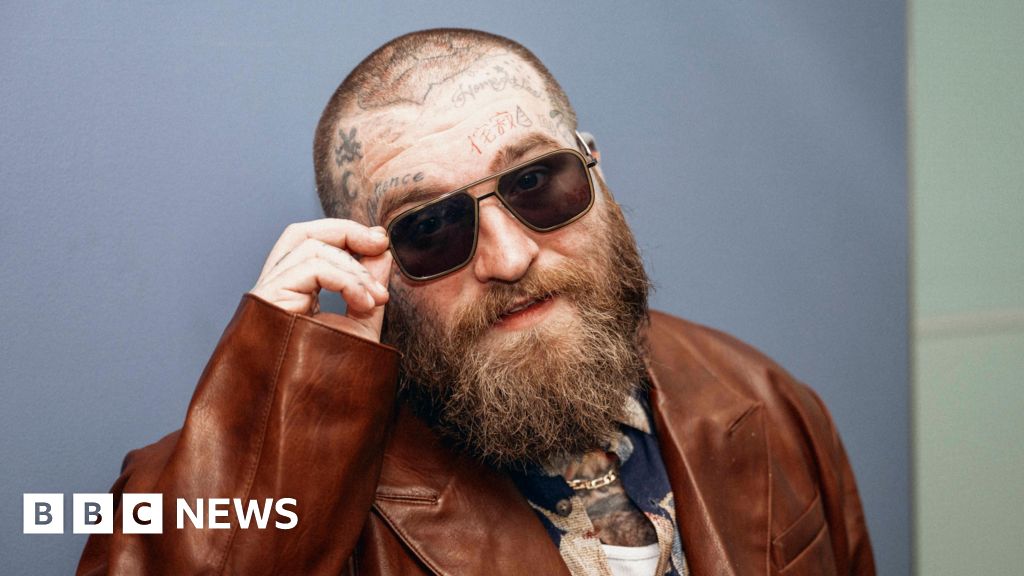ARTICLE AD BOX
Sir Salman Rushdie on the stabbing attack
By Alan Yentob & Noor Nanji
BBC
Sir Salman Rushdie has spoken in chilling detail to the BBC about what he remembers of the attack two years ago, in which he was stabbed on stage.
The Booker Prize-winning author said his eye was left hanging down his face "like a soft-boiled egg", and that losing the eye "upsets him every day".
"I remember thinking I was dying," he said. "Fortunately, I was wrong."
Sir Salman said he is using his new book, Knife, as a way of fighting back against what happened.
The attack took place at an education institute in New York state in August 2022, as he was preparing to give a lecture.
He recalled how the assailant came "sprinting up the stairs" and stabbed him 12 times, including in his neck and abdomen, in an attack lasting 27 seconds.
"I couldn't have fought him," the author said. "I couldn't have run away from him."
Watch: From the scene where Salman Rushdie was attacked on stage
Sir Salman said he fell to the floor, where he lay with "a spectacular quantity of blood" all around him.
He was taken to a hospital by helicopter and spent six weeks recovering there.
The Indian-born British-American author, 76, is one of the most influential writers of modern times. The attack dominated news headlines across the world.
Alan Yentob and Sir Salman, pictured with Lady Rushdie, have known each other more than 40 years
Sir Salman previously spent several years in hiding after the 1988 publication of The Satanic Verses triggered threats against his life.
He admitted he had thought someone might "jump out of an audience" one day. "Clearly it would've been absurd for it not to cross my mind."
He said he'd had a "nightmare" about the attack, two days before his event, and as a result didn't want to go.
"And then I thought, you know, it's a dream. And plus, they're paying me quite well. Everybody's bought tickets. I should go."
'Upset every day'
The attack damaged Sir Salman's liver and hands, and severed nerves in his right eye.
His eye looked "very distended, swollen," he said. "It was kind of hanging out of my face, sitting on my cheek, I've said like a soft-boiled egg. And blind."
Sir Salman said losing one eye "upsets me every day". He finds he has to take greater care when walking down stairs, or crossing a road, or even when pouring water into a glass.
But he considers himself lucky to have avoided brain damage. "It meant I was actually still able to be myself."
Image source, Getty Images
Image caption,A rally to show solidarity for free expression was held in New York after Sir Salman was attacked
The moderator at the event where Sir Salman was stabbed told the BBC he wished he could have done more to prevent the attack.
"You feel like if you had acted quicker, a lot of this could've been prevented," said Henry Reese.
But Sir Salman's gratitude to the people who helped him on the day, including Mr Reese, as well as the doctors who cared for him, is clear from the very opening page of Knife.
The book is dedicated, simply, to "the men and women who saved my life".
'Is that a reason to kill?'
For the first time, Sir Salman has revealed what he would like to say to his alleged attacker.
Hadi Matar, a 26-year-old New Jersey resident, has been charged with stabbing him. Mr Matar has pleaded not guilty and is being held without bail.
In an interview with the New York Post from jail, Mr Matar said he had watched videos of Sir Salman on YouTube. "I don't like people who are disingenuous like that," Mr Matar said.
Sir Salman Rushdie speaks about the knife attack which almost ended his life in 2022, in an interview with Alan Yentob ahead of the publication of a new book about the aftermath of the incident.
In Knife, Sir Salman has an imaginary conversation with his attacker, in which he responds to that.
"In America, many people pretend to be honest, but they wear masks and lie. And would that be a reason to kill them all?" he asks.
Sir Salman has never met Mr Matar. But he is likely to come face to face with him in court when the trial gets under way.
The trial was delayed after lawyers for the defendant argued they were entitled to review Sir Salman's book, as it could be evidence. It's now expected to take place in the autumn.
Why was The Satanic Verses so controversial?
Image source, Getty Images
Image caption,The Satanic Verses prompted widespread protests
Salman Rushdie shot to fame with Midnight's Children in 1981, which went on to sell more than one million copies in the UK alone.
But his fourth book, The Satanic Verses', depiction of the Islamic prophet Muhammad and its references to religion were considered blasphemous and banned in multiple Muslim-majority countries.
Iran's then-leader Ayatollah Ruhollah Khomeini issued a fatwa - or religious decree - in 1989, calling for Rushdie's assassination and placing a $3m (£2.4m) bounty on the author's head. That fatwa has never been rescinded.
As a result, Rushdie was forced into hiding for nearly a decade and required an armed bodyguard due to the number of death threats he received.
Sir Salman, who was born to non-practising Muslims and is an atheist, has long been a vocal advocate for the freedom of expression.
But he warned it has become "much more difficult".
"A lot of people, including a lot of young people, I'm sorry to say, have formed the opinion that restrictions on freedom of speech are often a good idea," he said.
"Whereas of course, the whole point of freedom of speech is that you have to permit speech you don't agree with."
Sir Salman recalls how, when he was lying in a pool of blood, he found himself "idiotically thinking" about his personal belongings.
He was worried his Ralph Lauren suit was getting ruined, and that his house keys and credit cards might fall out of his pocket.
"At the time of course, it's ludicrous. But in retrospect, what it says to me, is there was some bit of me that was not intending to die. There was some bit of me that was saying, 'I'm going to need those house keys, and I'm going to need those credit cards'."
He added that it was a "survival instinct" that was saying to him: "You're going to live. Live. Live."
A year before the attack, Sir Salman married his fifth wife, the American poet and novelist Rachel Eliza Griffiths.
Lady Rushdie told the BBC that when she heard about the attack, she "just started screaming. This was the worst day of my life."
Lady Rushdie describes being at Sir Salman's side as doctors sewed his eyelids together.
"I love his eyes, and he left home with two of them, and then our world changed," she said. "And now I love his single eye even more because of how he sees the world."
Sir Salman describes Knife as "at least as much a love story" as a story of horror.
"There were two forces in collision here. One was a force of violence, fanaticism, bigotry, and the other was the force of love," he said. "And of course, the force of love is embodied in the figure of my wife Eliza."
"And in the end, the way I understand what happened is that the force of love proved to be stronger than the forces of hatred."
Sir Salman said he will do public events again, but he will be "more careful" in future. "The security question is going to be the first question. Unless I'm satisfied about that, I'm not going to do it."
But he added, he is "a pretty obstinate person".
"I don't want some restricted or confined life," he said. "I'm going to have my life."

 9 months ago
31
9 months ago
31








 English (US) ·
English (US) ·